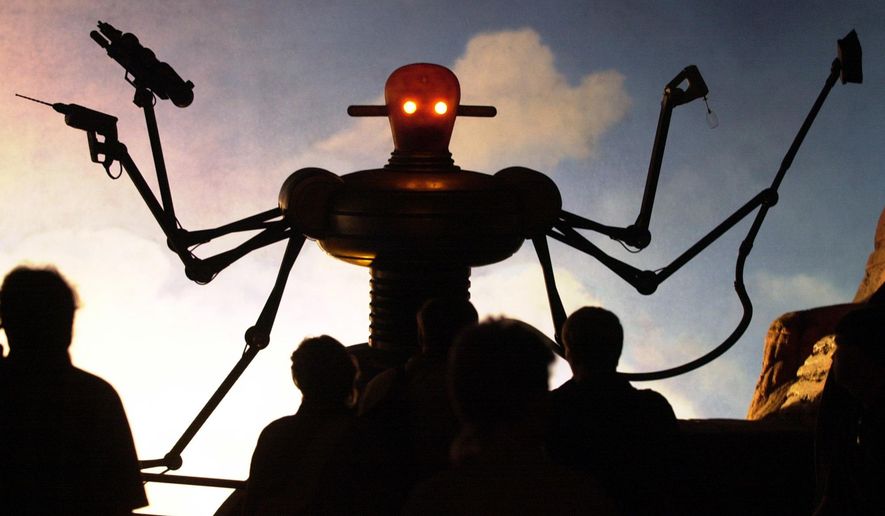OPINION:
The fast-moving field of artificial intelligence development is a lucrative one — a head-spinning one — an oft-surprising and exciting one.
But peer past the frenzy of media headlines announcing the latest discoveries and newest breakthroughs and it’s sad but true, the world of science, including technology, is a field dominated by godless leftists, too.
Look at this headline, from a New Yorker piece in September of 2015: “All Scientists Should be Militant Atheists.”
That was by cosmologist Lawrence Krauss, who also served as the director of the Origins Project at Arizona State University, an endeavor aimed at exploring the universe, humanity and technology. Krauss saw his career suffer a bit of a hit in 2018, on the heels of accusations by women of sexual harassment — accusations which he has strenuously denied, by the way. But his New Yorker words still sound loud: “In my more than thirty years as a practicing physicist, I have never heard the word ’God’ mentioned in a scientific meeting. Belief or nonbelief in God is irrelevant to our understanding of the workings of nature.”
Irrelevant? Illuminating is more like it.
It’s a viewpoint that aptly sums what a large faction of his fellow scientists seem to think.
In December 2015, researchers with the Religion and Public Life Program at Rice University in Texas launched a world-wide survey of thousands of biologists and physicists in eight regions of the world, including the United States, to gauge their religious beliefs. Why biologists and physicists?
They’re the ones who look at the origins of humans and the universe, the very topics that are covered in the Bible. And the authors of this study concluded this: “Scientists are indeed more secular — in terms of beliefs and practices — than those in their respective general populations.”
By the numbers, 35 percent of those scientists in this survey who hailed from the United States self-identified as atheist. In the United Kingdom, that figure stood at 40 percent. And in France, it was even higher — 51 percent.
Other surveys support these findings.
Pew Research in 2009 found that a significantly smaller portion of scientists who hold membership with the American Association for the Advancement of Science believe in God, as compared to those in the general public.
“Indeed,” Pew researchers wrote, “the survey shows that scientists are roughy half as likely as the general public to believe in God or a higher power.”
Now counter all that with this — the stats on the Bible readers, God-believers, of U.S. society.
A third of Americans told Pew Research in 2017 they read the Bible at least once a week; nine-in-10 Americans told Gallup in 2016 they believe in God; and 77 percent of those age 65 and older, and 52 percent of those ages 18 to 29 told PRRI/RNS in 2015 that believing in God was important for “being truly American.”
Schism? Truly.
Then there’s this rather alarming tale of Anthony Levandowski, the multi-millionaire who once led up Google’s autonomous car research arm but then left for a new career calling — as head of a religious nonprofit organization, Way of the Future, to “develop and promote the realization of a godhead based on artificial intelligence,” as Wired put it.
Basically, Levandowski wants to find the consciousness button that will make machines like humans so these creations can then “take care of the planet in a way we seem not to be able to do so ourselves,” according to the Way of the Future church website.
Creepy? A bit.
Perhaps Elon Musk truly was delivering a bit of prophesy when he likened AI development to “summoning the demon” back in a 2014 interview.
But if the spiritual divide between the world of science and technology and general population is large, the political gap may be even larger.
In 2009, Pew Research found that 55 percent of scientists leaned Democratic and 32 percent Independent, compared to only 6 percent Republican. At the time, the number of “general public” Americans identified in this Pew poll as Democratic stood at 35 percent; as Independent, 34 percent; and as Republican, 23 percent.
Fast-forward a few years and not much has changed in this tilt.
In 2017, the polling site FiveThirtyEight ran this headline: “When Scientists Donate To Politicians, It’s Usually To Democrats.” That, as Gallup found the same year in a poll of Americans at-large that 36 percent self-identified as conservative, compared to 25 percent as liberal.
So what’s the big takeaway?
For starters, this: The field of artificial intelligence could sure use some balance.
If technology is the wave of the future, then it doesn’t stand to reason that believers in God wouldn’t want to get in on the ground floor. Moreover, it doesn’t stand to reason that those already in the fields of science and technology, artificial intelligence and machine learning, would resist the influx of those possessed of both a faith for God and a genius for technology.
What is there to fear? What is there to lose?
After all, scientific inquiry involves pursuing all angles and avenues to get to the truth of a matter — even if it means raising unpopular points that are then put to the debunking test. Machine learning might learn a thing or two. Either way, thirty years is too long a time for meetings of scientists to go forth without at least a mention of God.
• Cheryl Chumley can be reached at cchumley@washingtontimes.com or on Twitter, @ckchumley.




Please read our comment policy before commenting.